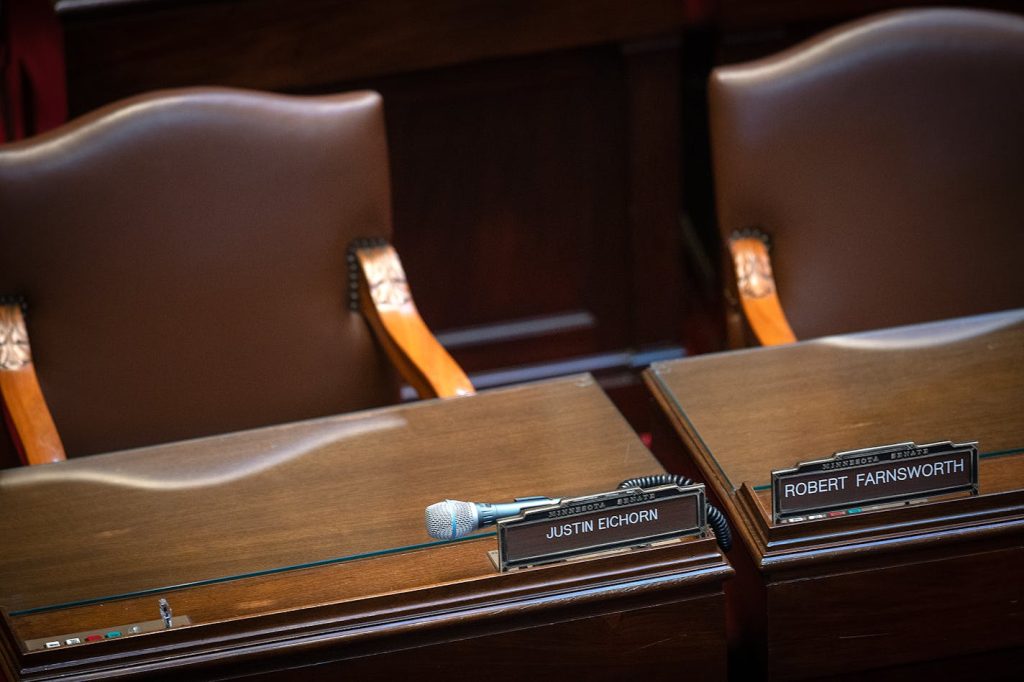In a startling turn of events, Minnesota State Senator Justin Eichorn has resigned following his arrest on charges of soliciting sex from a minor. This incident has sent shockwaves through the political landscape, particularly given Eichorn’s recent legislative activities and public persona.
The Arrest and Charges
On March 17, 2025, Senator Eichorn was apprehended during a sting operation conducted by the Bloomington Police Department. Authorities allege that Eichorn engaged in communications with an individual he believed to be a 17-year-old girl, who was, in fact, an undercover detective. The senator reportedly arranged to meet the purported minor for sexual purposes, leading to his arrest upon arrival at the designated location. He has been charged with soliciting a minor for prostitution and is currently held at the Hennepin County Adult Detention Center.
Legislative Background: The “Trump Derangement Syndrome” Bill
Just hours before his arrest, Eichorn introduced a controversial bill aiming to classify “Trump Derangement Syndrome” (TDS) as a recognized mental illness in Minnesota. The proposed legislation described TDS as “the acute onset of paranoia in otherwise normal persons that is in reaction to the policies and presidencies of President Donald J. Trump.” The bill further outlined symptoms such as intense hostility toward the former president and acts of aggression against his supporters.
The bill was widely criticized for trivializing legitimate mental health issues and for its overtly partisan nature. Many mental health professionals and political commentators viewed the proposal as a political stunt rather than a serious legislative effort. The introduction of such a bill highlighted the deep political divisions within the state and the nation at large.
Political Fallout and Resignation

The arrest prompted immediate and widespread calls for Eichorn’s resignation from both sides of the political aisle. Minnesota GOP Chairman Alex Plechash emphasized the necessity for elected officials to uphold higher standards of conduct and urged Eichorn to step down to maintain public trust and accountability. Similarly, Democratic leaders expressed shock and called for swift action to address the situation.
Facing mounting pressure, Eichorn submitted his resignation while in custody, stating, “I must focus on personal matters at this time.” His resignation came ahead of a planned expulsion vote by his colleagues, with fellow Republicans urging him to step down due to the gravity of the charges and the distraction they would cause. The resignation was seen as a necessary step to allow the legislative body to continue its work without the overshadowing presence of such serious allegations against one of its members.
Community Reaction and Public Debate
The incident has sparked intense discussions about ethics, accountability, and the responsibilities of public officials. Constituents expressed a mix of shock, disappointment, and anger over the allegations. Many felt betrayed by a leader who had positioned himself as a defender of traditional values and morality. The case has also reignited debates over the adequacy of background checks and the mechanisms in place to hold public officials accountable for their actions.
Community leaders and advocacy groups have called for a thorough investigation and for measures to prevent similar incidents in the future. There is a growing demand for transparency and stricter ethical guidelines for those in public office. The incident has also led to discussions about the importance of mental health support and counseling for individuals in high-stress positions, as a means to prevent such behavior.
Legal Proceedings and Potential Consequences
Eichorn’s legal troubles are just beginning. If convicted, he could face significant penalties, including imprisonment and mandatory registration as a sex offender. Legal experts note that the charges are severe and carry long-term consequences that would impact not only Eichorn’s personal life but also his professional prospects. The case is expected to proceed through the judicial system in the coming months, with close public and media scrutiny.
The legal proceedings will likely involve a detailed examination of the evidence gathered during the sting operation, including communications between Eichorn and the undercover officer. Defense strategies may focus on challenging the legality of the sting operation or the interpretation of the communications. However, given the nature of the charges and the evidence reportedly in possession of the authorities, legal analysts suggest that Eichorn faces an uphill battle in court.
Implications for the Republican Party and Future Elections
Eichorn’s arrest and resignation have significant implications for the Republican Party in Minnesota. The party now faces the challenge of distancing itself from the scandal while addressing the concerns of constituents. The incident could impact upcoming elections, as opponents may use it to question the judgment and integrity of the party’s candidates. Republican leaders are likely to increase efforts to vet candidates thoroughly and to implement stricter ethical standards to restore public trust.
The scandal also provides ammunition for political opponents to criticize the party’s leadership and decision-making processes. In response, the Republican Party may need to engage in introspection and reforms to demonstrate a commitment to ethical governance. This could include the establishment of oversight committees, the implementation of mandatory ethics training for candidates and elected officials, and more rigorous background checks during the candidate selection process.
Broader Discussions on “Trump Derangement Syndrome” and Political Discourse
The timing of Eichorn’s arrest, coming on the heels of his introduction of the “Trump Derangement Syndrome” bill, has added a layer of irony to the situation. The concept of TDS has been a contentious topic, often used to dismiss or ridicule critics of former President Trump. Eichorn’s bill sought to formalize this term as a recognized mental illness, a move that was met with criticism from mental health professionals and political analysts alike.
The incident has prompted a reevaluation of the use of such terms in political discourse. Critics argue that labeling opposition as a mental illness is a dangerous precedent that undermines legitimate political debate and trivializes actual mental health issues. The controversy surrounding the bill highlights the need for more respectful and substantive discussions in politics, focusing on policies and ideas rather than ad hominem attacks.
Reflections on Power, Responsibility, and Public Trust
Eichorn’s downfall serves as a stark reminder of the responsibilities that come with public office. Elected officials are entrusted with the public’s confidence and are expected to uphold the highest ethical standards. When those standards are breached, it not only tarnishes the individual’s reputation but also erodes public trust in governmental institutions. This incident underscores the necessity for robust mechanisms to ensure accountability and integrity among public servants. As the legal proceedings unfold, they will serve as a critical examination of the balance between personal misconduct and public responsibility, prompting ongoing discussions about the ethical obligations of those in positions of power.

